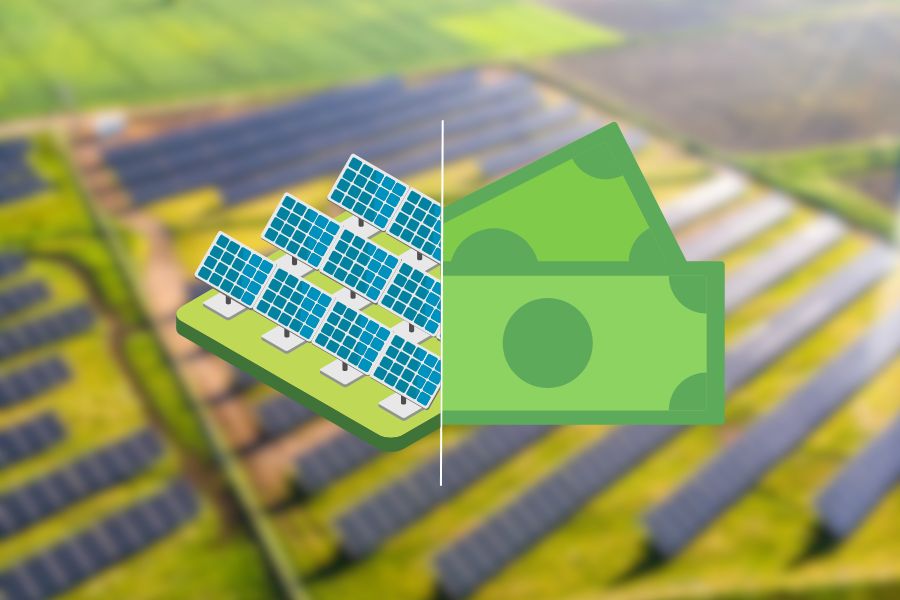Leasing land for solar panels in Ireland presents enticing opportunities and considerations. On one hand, it offers landowners a chance to generate steady revenue without significant upfront investments.
Conversely, there are factors like long-term land commitment and potential land use restrictions to ponder. However, as with any venture, it comes with its own set of considerations.
Here, we’ll provide a balanced view, helping you navigate the intricacies of this choice without compromising your land’s potential or future opportunities.
What Is a Solar Panel Lease Agreement?
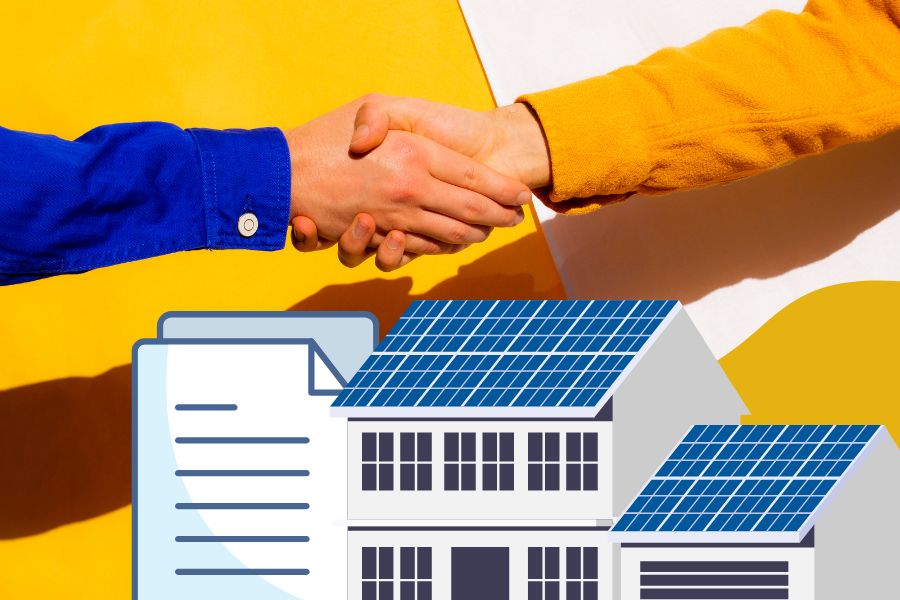
A solar panel lease agreement is a contractual arrangement between a homeowner or business owner and a solar provider or solar energy company, where the provider installs solar panels on the property but retains ownership of the panels.
The homeowner or business does not pay for the solar panels upfront; instead, they lease the panels from the provider, typically for a set period of time (often 20-25 years).
Here are some key features and considerations of a solar panel lease agreement:
Monthly Lease Payments
Instead of bearing the upfront cost of the solar panel system, the property owner agrees to make monthly lease payments to the solar provider for the duration of the lease term.
Maintenance and Repairs
Since the solar company retains ownership of the panels, they are usually responsible for maintenance, monitoring, repairs, and installing solar panels, ensuring the system functions properly.
Energy Savings
The homeowner or business typically benefits from the electricity generated by the solar panels, which can reduce their electricity bill. However, they are often still connected to the grid and might need to purchase additional electricity from the utility during times when the solar panels don’t produce enough.
No Upfront Cost
One of the major attractions of solar leases is that they often require no or minimal upfront costs. This makes solar energy accessible to more people who might not have the capital to invest in a solar system outright.
End of Lease Options
At the end of the lease term, there are generally a few options: renew the lease, purchase the system at a reduced price (as determined by the contract), or remove the system.
Performance Guarantee
Many solar panel installation leases come with a performance guarantee, where the solar company guarantees that the panels will produce a certain amount of electricity.
Transferability
If the homeowner decides to sell the property, the leased solar panels agreement usually has provisions for transferring the lease to the new homeowner. Understanding these terms is important because some buyers may hesitate to take on a solar lease.
Potential for Increased Home Value
While the leased equipment doesn’t add as much value as owned solar panels, the reduced electricity costs can attract potential buyers.
Tax Credits and Incentives
Since the solar company owns the panels, they typically claim any available federal, state, or local tax credits and incentives, not the homeowner.
Buyout Options
Some leases might provide options for the property owner to buy the solar system before the end of the lease term, but the specifics would be outlined in the lease agreement.
Pros of Leasing Land for Solar Panels
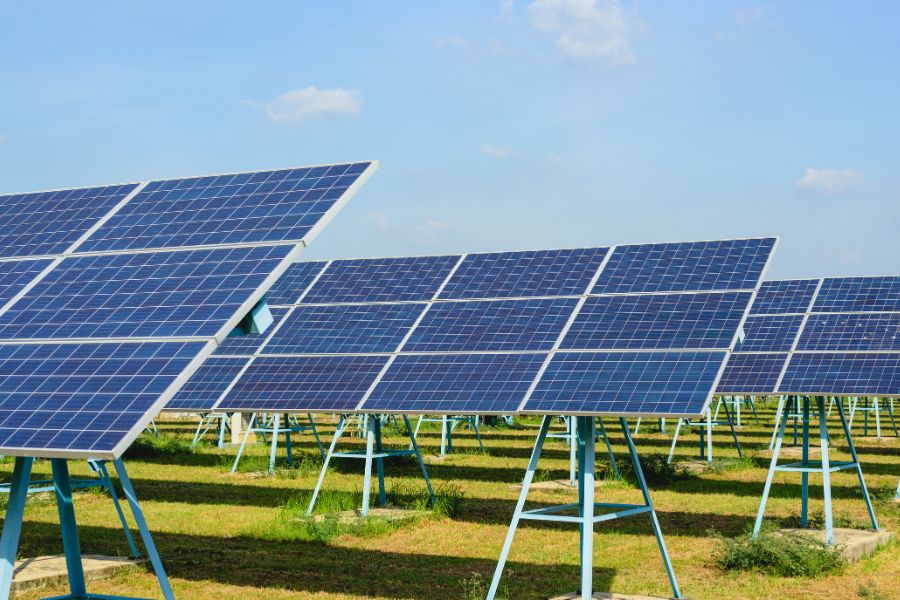
1. Steady Income Stream
Leasing out land for solar farms can provide landowners a consistent and predictable income over the lease term. This can be especially helpful for those in the agricultural sector, where incomes might be more volatile.
2. Land Preservation
This is one of the leasing solar panels pros. Solar farms have a lower impact on the land than other uses. Once the lease is up or the panels are decommissioned, the land can easily revert to its previous state.
3. Supporting Green Initiatives
By leasing land for solar energy, landowners contribute to increasing the renewable energy supply in Ireland and promote sustainable farming practices aligned with the country’s goals to combat climate change and reduce dependency on fossil fuels.
4. Minimal Effort
Once the solar panels are installed, they require minimal oversight or intervention from the landowner. The landowner can earn from the lease without much added effort or responsibility.
5. Diversification
For farmers or landowners, leasing a portion of their land for solar panels provides an opportunity to diversify their sources of income, reducing the risk associated with relying on a single source.
6. Increased Land Value
There’s potential for increased land value when the land is used for renewable energy. This might be attractive for those thinking about selling their property in the future.
7. Tax Benefits
Depending on local regulations and incentives, tax benefits or grants may be available for landowners who lease their land for renewable energy projects.
8. Community Benefits
Solar farms can generate local jobs and stimulate economic growth in an area. Plus, local communities benefit from the increased production of clean energy.
9. Safety and Low Nuisance
Solar farms are quiet and don’t produce pollution compared to other industrial uses, which might be more amenable to neighboring properties and the broader community.
10. Support from the Government
The Irish government has shown support for renewable energy initiatives. This includes plans and policies favoring expanding renewable energy sources, which can assure those considering such investments.
Cons of Leasing Land for Solar Panels
While leasing land for solar panels in Ireland comes with a number of advantages, there are also potential drawbacks that landowners should consider:
1. Long-term Commitment
Solar leases often span 20 to 30 years. While this guarantees a stable income for the landowner, it also ties up the land for a long duration, limiting its use for other potential ventures or changes in land usage.
2. Difficulty in Terminating Agreements
If a landowner changes their mind or encounters unforeseen circumstances, it might be challenging to terminate the lease before its expiration without incurring penalties.
3. Land Use Restrictions
Once a solar panel system is installed, the use of that land is primarily restricted to solar energy production. This can limit the landowner’s ability to use the land for other purposes, such as agriculture or development.
4. Aesthetic Concerns
Large solar installations can alter the landscape and might not be aesthetically pleasing to everyone. This can be a concern if the land is in a scenic area or if neighbors object to the appearance.
5. Dependence on the Company’s Financial Stability
If the solar company goes bankrupt or faces financial difficulties, it might affect the maintenance of the solar panels or the landowner’s guaranteed income.
6. Property Value Impact
While some argue that solar farms can increase property value, others believe it could deter potential future buyers who might want to use the land for different purposes.
7. Potential Environmental Concerns
Even though solar panels are a clean energy source, large-scale installations can disrupt local ecosystems. The construction process might affect local wildlife, water runoff patterns, or other environmental aspects.
8. Land Degradation
Infrastructure associated with solar farms, like access roads or panel foundations, might lead to soil compaction or other forms of land degradation.
9. Loss of Agricultural Production
Agricultural production and potential associated income are lost if the land was previously used for agriculture.
10. Legal and Contractual Complexities
Leasing land for solar energy can involve complex contracts. Landowners must ensure they fully understand the terms and implications, and this often requires legal consultation, which is an additional cost.
11. Local Opposition
Local opposition might be to installing large-scale solar farms, especially in areas that have not seen such developments before. This could lead to tension in the community.
Can I Buy Solar Energy System at the End of the Lease
When entering a solar panel lease agreement, you rent the solar system for a set period, often 20-25 years.
At the end of this lease term, many agreements offer several options, including the opportunity to purchase the system.
The price might be predetermined in your contract or based on the system’s market value at that time.
However, terms can vary between providers. Some might require you to remove the panels if you don’t want to continue, while others might allow you to extend the lease.
Before signing, it’s crucial to understand your end-of-lease options.
If owning the system eventually is important, ensure this provision is included in your contract. Always consult the specifics of your agreement and seek advice if needed.
What’s the Difference Between Leasing Land to a Solar Project Developer Versus a Broker or Land Agent?
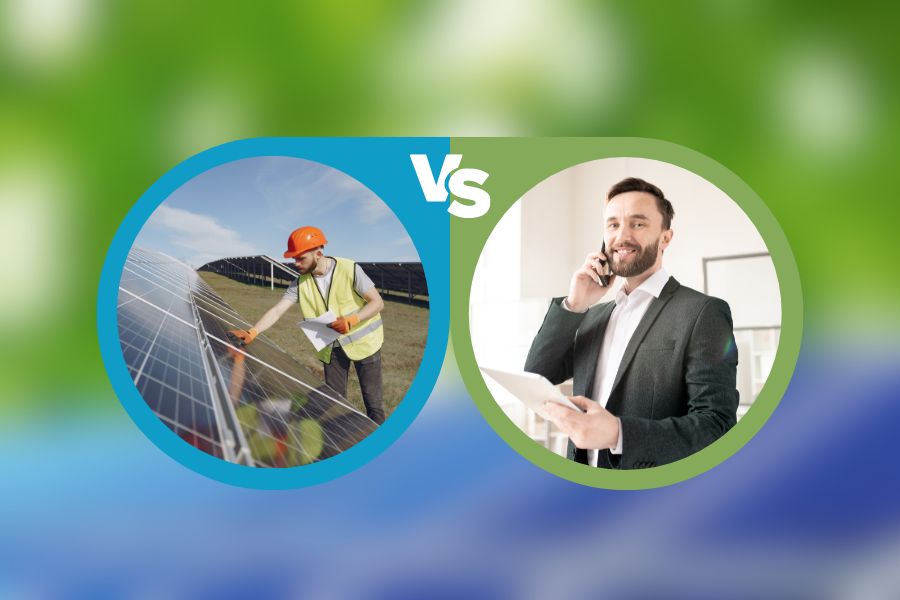
Solar Project Developer
This is the entity directly planning, financing, and operating the solar energy project. They’re in it for the long haul, from the project’s inception to its operational life, often spanning decades. Their main interest lies in the project’s viability and profitability.
Broker or Land Agent
These are go-betweens. They connect landowners with developers or represent developers to find suitable land. Their role is short-term, primarily focused on sealing the deal through a lease or sale. They typically earn their keep from commissions or fees based on successful transactions.
In essence, while the developer is concerned with the long-term success of the solar installation on your land, the broker or agent focuses on facilitating the lease or purchase transaction.
There is a difference between long-term commitment versus transactional engagement. Knowing who you’re dealing with can shape the agreement’s terms and your leasing experience.
How Long Does It Take to Lease Land for a Solar Farm?
Leasing land for a solar farm in Ireland involves multiple stages. Initially, a solar developer identifies and contacts potential landowners, taking a few weeks to several months for negotiations.
Following preliminary agreements, feasibility studies, including solar potential and environmental assessments, are conducted.
Securing necessary permits and approvals, especially from local councils, can be time-consuming, spanning several months to a few years.
Additionally, grid connection approval might extend the timeline. On average, from initial contact to final lease agreement and project initiation, the process in Ireland can take anywhere from 2 to 5 years, depending on specific challenges and complexities.
Is Leasing Solar Panels Worth It?
Leasing solar panels allows homeowners to benefit from solar energy without the high upfront cost. Including the following benefits:
- Potential electricity bill savings
- Supporting renewable energy
However, since the homeowner doesn’t own the system, they may not benefit from government incentives and might have complications when selling their home.
It depends on individual financial situations, energy costs, lease terms, and personal values.
Does Solar Farm Development Interfere With Farming Operations?
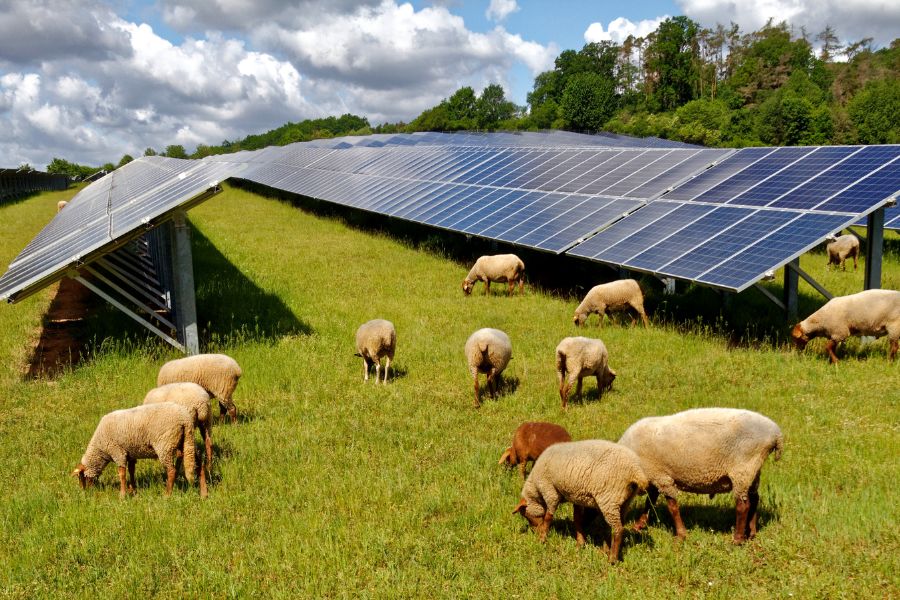
Solar farms do require significant land areas, which can preclude traditional farming on the leased portion. However, some farming activities like sheep grazing, can coexist with solar farms.
Additionally, agrovoltaics, a method of integrating solar panels and agriculture, is being explored to ensure solar farms and agriculture can operate symbiotically.
What Are Lease Rates per Acre for a Solar Farm?
Lease rates for solar farms in Ireland can vary significantly based on various factors. These include the following:
- Location of the land (proximity to electrical infrastructure, for instance)
- Suitability for solar (how much sunlight it gets, the slope, and orientation)
- Specifics of the lease agreement (length of lease, developer demands, etc.).
Generally, in Ireland, the lease rates for solar farms have been reported to range between €500 and €1,200 per acre annually.
However, these figures can vary, and there are instances where rates can go higher, especially if the land is particularly well-suited for solar development.
Do You Need to Qualify for Most Tax Credits and Incentives
Yes, in Ireland, there are tax incentives and grants for solar installations, primarily through schemes like the Sustainable Energy Authority of Ireland’s (SEAI) solar PV grant.
To avail of these incentives, specific criteria must be met, which may include:
- The system’s size
- Installation standards
- Homeowner Eligibility
Ensure you check the latest guidelines from the SEAI or other relevant bodies.
Can You Lease the Surface if You Already Leased the Minerals for Oil and Gas?
Ireland doesn’t have a significant oil and gas industry like countries such as the US.
However, the right to lease surface land for purposes like solar farms is typically separate from subsurface mineral rights.
If minerals were previously leased, it’s essential to review that agreement to ensure there are no restrictions on surface usage. Legal counsel might be necessary to clarify rights and potential conflicts.
Do I Have to Pay Any Upfront Costs if I Lease My Land for a Solar Farm?
Typically, when a landowner leases their land to a solar developer in Ireland, the developer bears the costs associated with the solar project, including feasibility studies, planning, installation, and grid connection.
It’s rare for a landowner to pay any upfront costs. However, the lease agreement will outline the specifics, so always review it thoroughly and consider seeking legal advice before finalizing any deal.
Conclusion
Leasing land for solar panels presents a unique opportunity for landowners to turn idle or underutilized parcels into a consistent revenue stream while also supporting the transition to renewable energy, and we explored the pros and cons of leasing land for solar panels
On the upside, it offers potential long-term income, minimal involvement, and a chance to partake in environmental stewardship.
Conversely, potential challenges, including land use restrictions, long lease durations, and fluctuating lease rates, merit consideration. As with any significant venture, it’s crucial for landowners to weigh these pros and cons carefully.
Informed decisions, backed by thorough research and expert consultation, will ensure that the sun is not only on the panels but also on the terms and outcomes of the lease agreement.
